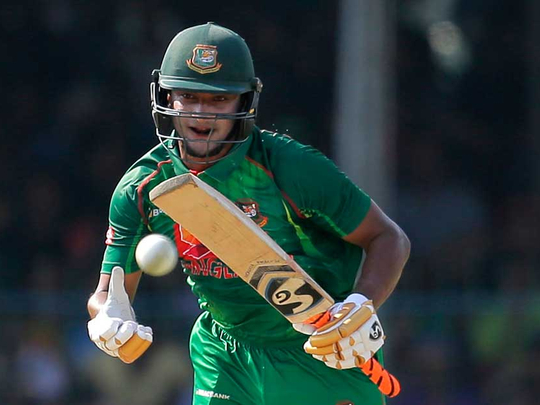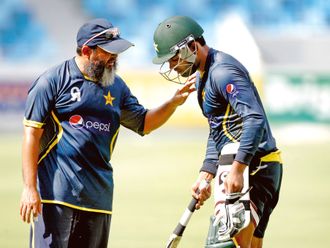
Dhaka: Who is the best Test all-rounder in the world? The conversation has resurfaced during the English Test summer, dominated by Moeen Ali and Ben Stokes, and India’s spin duo of Ravichandran Ashwin and Ravindra Jadeja. Yet there is one figure often wrongly ignored from this debate.
Shakib Al Hassan is the world’s best Test all-rounder, according to the International Cricket Council’s rankings — and, just for good measure, the premier all-rounder in both One Day International and Twenty20 cricket too.
If his enduring excellence is not more widely appreciated beyond Asia, it is no slight on him. Instead, it is a reflection of how Bangladesh have been treated as a second-rate cricketing nation. Shakib has played 49 of Bangladesh’s 56 Tests since his Test debut in 2007; England have played 131 in this time and Australia 114.
“It is frustrating,” he said, while playing for Jamaica Tallawahs during the Caribbean Premier League. “We can see the difference. But that’s how it is. We can’t do anything.”
Since his Test debut in 2007 Shakib has been Bangladesh’s totem, simultaneously fulfilling the role of frontline batsman and bowler with a reliability that few in Test history have matched. He averages 40.92 with the bat and 33.04 with the ball, numbers that bear comparison with cricketers venerated as greats; both figures actually improve away from home, in defiance of the traditional jibe that subcontinental players cannot replicate their success beyond home climes.
And he has done it all while bearing a burden of responsibility for his team’s fortunes perhaps not mirrored by anyone else in world cricket today. Shakib’s many successes have brought no guarantees of team triumphs — 217 in Wellington in January came in a painful Test loss — but his failures have virtually ensured Bangladeshi defeats.
Most egregiously, Bangladesh have not played a single Test against Australia during Shakib’s entire career, making this impending series — rescheduled following Australia’s withdrawal for security reasons in 2015 — all the more significant. “None of our team members in this squad played Tests against Australia, so it will be very exciting.”
When Australia finally meet Shakib, they will not merely confront a wonderfully crafty left-arm spinner and batsman adroit at manipulating the ball precisely, but a historic figure in world cricket. For it is Shakib who has done more than anyone else to transform Bangladesh from a ragtag side, who were the joke of world cricket — as in their notorious run of 71 defeats in 72 internationals from 1999 to 2004 — into a team who loom as the game’s next major force.
In the last year alone, Bangladesh have reached the Champions Trophy semi-finals, cementing their ODI ranking of seventh, and defeated England at home in a Test and Sri Lanka away — where their 1-1 series draw bodes ill for Australia, who lost 3-0 in Sri Lanka in 2016.
“It’s been a long journey,” Shakib reflects. “It’s been incredible. I don’t think many people thought — even in Bangladesh — that we can come this far.”
Shakib credits foreign coaches with increasing fitness and professionalism and has observed how Bangladesh’s cricket infrastructure has been lifted as investment has increased.
During the many barren years, a lack of self-belief also stymied the team. “We knew that we have this ability, and we needed that belief, and we can only get this belief by winning matches,” he says. “But there is no shortage of self-belief at this moment… Now we feel that we are very much unbeatable at home — doesn’t matter who we are playing against. So this is the belief that makes a team a very good team, and a winning team.”
In Test cricket, Shakib believes the decisive shift in Bangladesh’s mentality came with the “big decision” the team took before the Test series with England last year. “Previously the mindset was to draw against big teams — try to play five days, make a draw — but we never used to get the result. Then we started thinking ‘let’s try to win — let’s try to play and win the game’. It’s the mindset that changed, and that made us believe that we can win.”
Really, his Bangladesh teammates are just mirroring Shakib himself, whose 11 years in international cricket have been characterised by combativeness, thriving under pressure and fierce self-belief. These traits were nurtured in childhood, where Shakib grew up in a middle-class home in Magura, in south-west Bangladesh.
“When I used to play with the tennis ball at my home in Magura, I hated losing. Most of the time I used to win. And I always liked batting, bowling, and fielding — I wanted to be the best. The fighting mindset was there from childhood — I don’t know where that came from, but it was there, from the earliest time that I can remember.”
Such qualities earned Shakib selection for the Bangladesh Krira Shikkha Protishtan, the national sports institute, at the age of 13, just as Bangladesh were gaining Test status.
“Coaches used to tell me that you’ll be someone that people will follow — you’re not following anyone.”
The coaches were right. Shakib has emerged as not merely the finest cricketer in the nation’s history but probably the single most recognisable figure in Bangladesh today.
“If you’re talking about normal roads and all, it is very difficult,” he laughs when asked if he can venture outside. “They used to say that you can’t go out regularly when you play for the national team — your life will be different. And I have had that in my mind, that that will be my life.
“It’s like a religion, in Bangladesh. When we play cricket, everyone is glued to their TV. You know, when they have access to the match, no one is going to do anything other than watch cricket. In that perspective, I think we are very lucky that we get that support from our country.”
Sometimes such expectations have been overwhelming. Shakib has encountered several disciplinary problems — including threatening a spectator who caused play to stop by moving near the sightscreen; and making an obscene gesture when the cameras were focusing on him incessantly after a dismissal — culminating in a six-month ban from the Bangladesh Cricket Board in 2014, on account of his “serious misbehaviour” with the coach.
“It made me calm,” Shakib reflects. “That one time made me so strong, mentally, that I know that no one can break me now.” He has not been in trouble since. Instead, as he has become a father, Shakib has developed a parallel life away from cricket.
“I don’t read papers, I don’t watch any news, and I don’t talk to most people — just my family members and close friends that I talk to, and they never talk to me about cricket. So basically I just practise, and enjoy my time with my family when I’m at home. I think that’s helped me a lot to perform well.”
At 30, he is playing better than ever, and entitled to dream about what is possible from Bangladeshi cricket. “I think we can be world-beaters. I think we have very good potential to go all the way in 2019 World Cup — if not, 2023.”
More Test matches — 17 years have only brought 100, fewer than six a year — will lead to the side “performing a lot better than we are now”. Such tantalising possibilities remain ahead and, beginning against Australia this week, the chance to make more history. Yet Shakib’s greatest legacy is already secure.
When he grew up, almost all of the cricket on TV in Bangladesh involved other subcontinental sides. Naturally, Shakib looked up to these players, especially the Pakistan’s Saeed Anwar and Saqlain Mushtaq. Now, young Bangladeshis do not need to look beyond their borders for their cricketing heroes. They look to Shakib instead.











